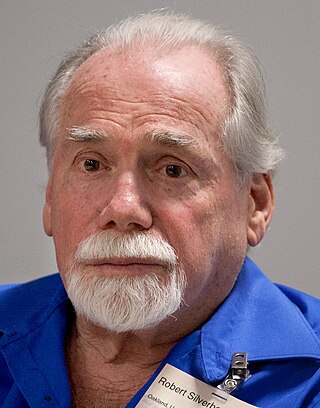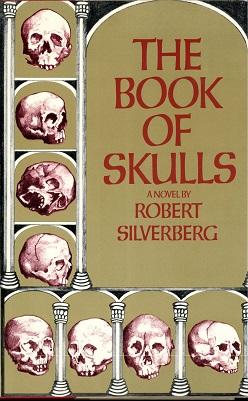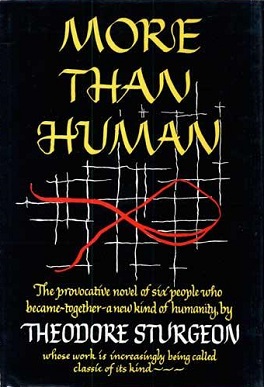
A novella is a narrative prose fiction whose length is shorter than most novels, but longer than most short stories. The English word novella derives from the Italian novella meaning a short story related to true facts.

Prester John was a legendary Christian patriarch, presbyter, and king. Stories popular in Europe in the 12th to the 17th centuries told of a Nestorian patriarch and king who was said to rule over a Christian nation lost amid the pagans and Muslims in the Orient. The accounts were often embellished with various tropes of medieval popular fantasy, depicting Prester John as a descendant of the Three Magi, ruling a kingdom full of riches, marvels, and strange creatures.

Robert Silverberg is an American author and editor, best known for writing science fiction. He is a multiple winner of both Hugo and Nebula Awards, a member of the Science Fiction and Fantasy Hall of Fame, and a Grand Master of SF. He has attended every Hugo Award ceremony since the inaugural event in 1953.
Roger Elwood was an American science fiction writer and editor, who edited a large number of anthologies and collections for a variety of publishers in the early to mid-1970s.

Gordon Randall Phillip David Garrett was an American science fiction and fantasy author. He was a contributor to Astounding and other science fiction magazines of the 1950s and 1960s. He instructed Robert Silverberg in the techniques of selling large quantities of action-adventure science fiction, and collaborated with him on two novels about men from Earth disrupting a peaceful agrarian civilization on an alien planet.

The Book of Skulls is a science fiction novel by American writer Robert Silverberg, first published in 1972. It was nominated for the Nebula Award in 1972, and both the Hugo and Locus Awards in 1973.

A Time of Changes is a 1971 science fiction novel by American writer Robert Silverberg. It won the Nebula Award for that year, and was also nominated for the 1972 Hugo and Locus Awards.

The Man in the Maze is a science fiction novel by American writer Robert Silverberg, originally serialized in the magazine, Worlds of If April in May 1968, and published in bookstores the following year. It tells the tale of a man rendered incapable of interacting normally with other human beings by his uncontrollable psychic abilities. The novel is inspired by Sophocles' play Philoctetes, with the roles of Odysseus, Neoptolemus and Philoctetes played by Boardman, Rawlins, and Muller, respectively.

The Science Fiction Hall of Fame, Volume One, 1929–1964 is a 1970 anthology of English language science fiction short stories, edited by Robert Silverberg. Author Lester del Rey said that "it even lives up to its subtitle", referring to the volume's boast of containing "The Greatest Science-Fiction Stories of All Time".

Solar Lottery is a 1955 science fiction novel by American writer Philip K. Dick. It was his first published novel and contains many of the themes present in his later work. It was also published in altered form in the UK as World of Chance. The main story is about a man named Ted Benteley who lives in a strange world, dominated by percentages and the lottery. Lotteries are used to choose the next leader as well as a new assassin, whose job is to try to kill the leader or "Quizmaster". Everybody in society has the opportunity to be selected as a leader or an assassin. Benteley unexpectedly gets chosen to be a member of the committee trying to assassinate the new Quizmaster and he must decide what he is going to do.

More Than Human is a 1953 science fiction novel by American writer Theodore Sturgeon. It is a revision and expansion of his previously published novella Baby Is Three, which is bracketed by two additional parts written for the novel . It won the 1954 International Fantasy Award, which was also given to works in science fiction. It was additionally nominated in 2004 for a "Retro Hugo" award for the year 1954. Science fiction critic and editor David Pringle included it in his book Science Fiction: The 100 Best Novels.
A fix-up is a novel created from several short fiction stories that may or may not have been initially related or previously published. The stories may be edited for consistency, and sometimes new connecting material, such as a frame story or other interstitial narration, is written for the new work. The term was coined by the science fiction writer A. E. van Vogt, who published several fix-ups of his own, including The Voyage of the Space Beagle, but the practice exists outside of science fiction. The use of the term in science fiction criticism was popularised by the first (1979) edition of The Encyclopedia of Science Fiction, edited by Peter Nicholls, which credited van Vogt with the creation of the term. The name “fix-up” comes from the changes that the author needs to make in the original texts, to make them fit together as though they were a novel. Foreshadowing of events from the later stories may be jammed into an early chapter of the fix-up, and character development may be interleaved throughout the book. Contradictions and inconsistencies between episodes are usually worked out.

Son of Man is a science fiction novel by American writer Robert Silverberg, published in 1971. The book is about Clay, a 20th-century man, who travels billions of years into the future and meets humanity in its future forms. Some of the issues discussed in the book are sexuality, telepathic communication between people, physical prowess or frailty, division of humans by caste or ability, and the preservation of ancient wisdom, among other things.

Gilgamesh in the Outback is a science fiction novella by American writer Robert Silverberg, a sequel to his historical novel Gilgamesh the King as well as a story in the shared universe series Heroes in Hell. It won the Hugo Award for Best Novella in 1987 and was also nominated for the Nebula Award for Best Novella in 1986. Originally published in Asimov's Science Fiction, it was then printed in Rebels in Hell before being incorporated into Silverberg's novel To the Land of the Living. Real-life writers Robert E. Howard and H. P. Lovecraft feature as characters in the novella.

Flowers for Algernon is a short story by American author Daniel Keyes, later expanded by him into a novel and subsequently adapted for film and other media. The short story, written in 1958 and first published in the April 1959 issue of The Magazine of Fantasy & Science Fiction, won the Hugo Award for Best Short Story in 1960. The novel was published in 1966 and was joint winner of that year's Nebula Award for Best Novel.

Thorns is a science fiction novel by American author Robert Silverberg, published as a paperback original in 1967, and a Nebula and Hugo Awards nominee.
The following is a list of works by Arthur C. Clarke.
A mindwipe is a fictional memory erasure procedure in which the subject's memories and sometimes personality are erased. Often those are replaced by new memories more useful to those who are carrying out the mindwiping. It is a more thorough form of brainwashing. It is sometimes used as an alternative to capital punishment, or to make the subject more useful to the system. The mindwipe can be performed by a hypnotic or magical ability, or by an electronic device. It is often coupled with stories where the characters have amnesia, although the latter concept includes cases that occur naturally or by accident instead of the result of a deliberate procedure.

Starborne is a 1996 science fiction novel by American writer Robert Silverberg, an expansion of his 1973 story "Ship-Sister, Star-Sister".
















